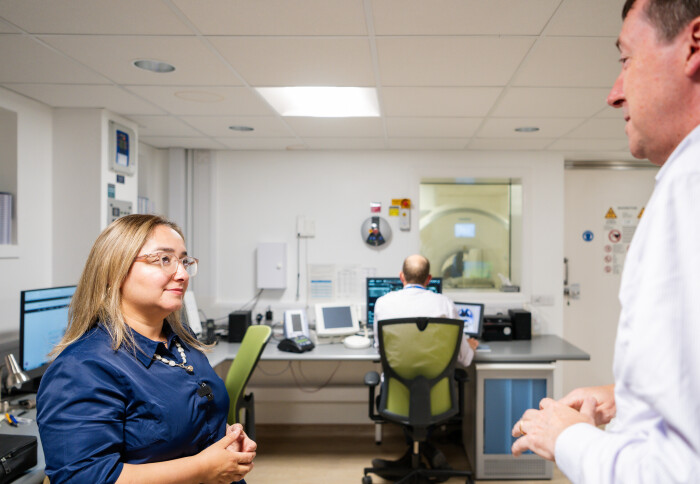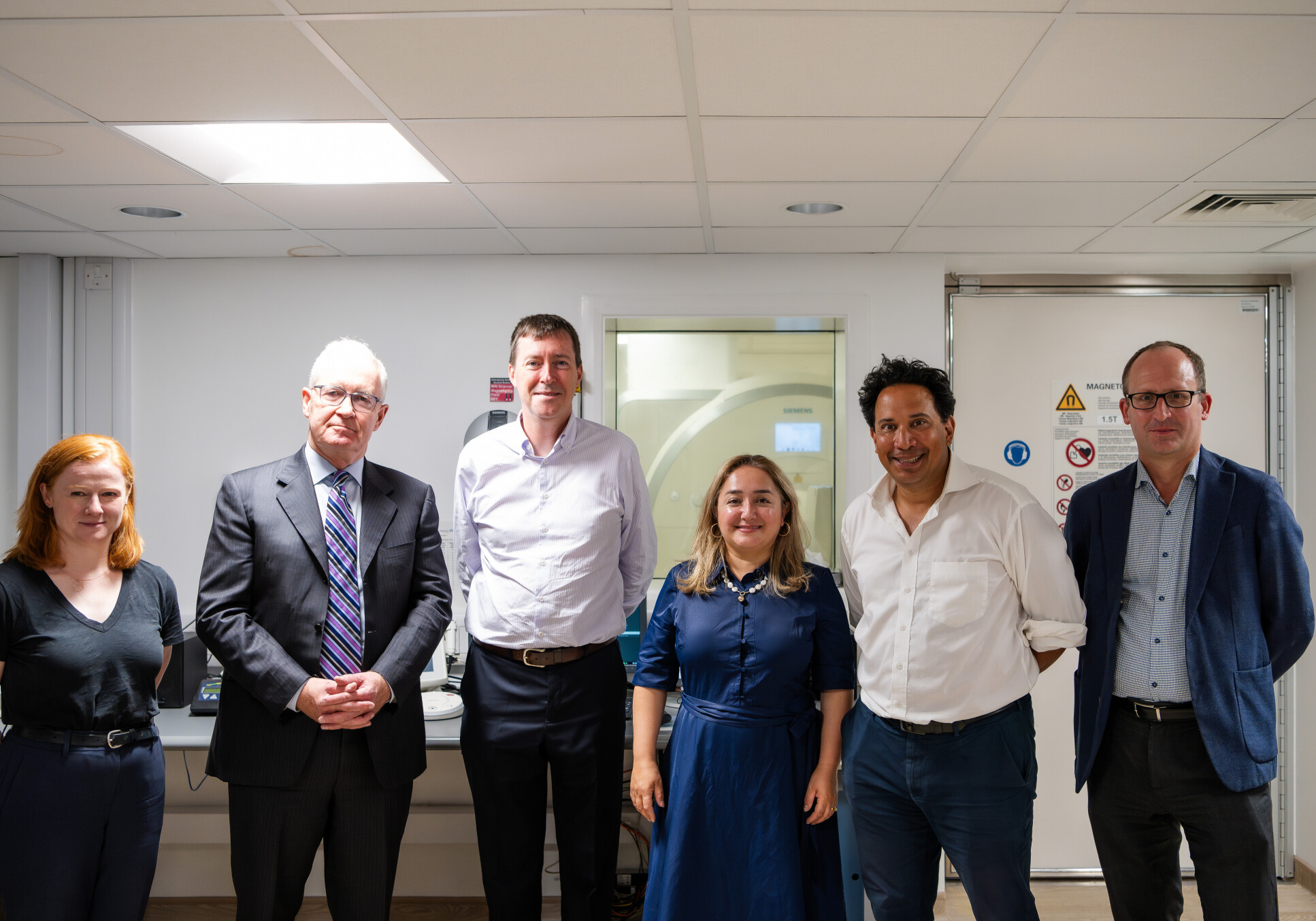AI Minister visits Imperial to see pioneering AI research to improve healthcare
by Nazza Ahmed

The Minister for AI and Digital Government Feryal Clark MP learned about the role of AI tools in healthcare at the Hammersmith Hospital Campus.
Hosted by Imperial’s President, Professor Hugh Brady, the new Parliamentary Under-Secretary of State for AI and Digital Government Feryal Clark MP visited Imperial’s Hammersmith Hospital Campus this week to see cutting-edge AI tools in healthcare for the benefit of patients.
President Brady highlighted Imperial’s vast AI Network which brings together the combined power of over 1,000 researchers across all faculties and disciplines working to accelerate the safe and productive development and deployment of AI, including in the thriving AI and healthcare ecosystem.
Imperial are also creating a new School for Human and Artificial Intelligence – one of four new Schools of Convergence Science – and a new World Economic Forum Centre for AI Driven Innovation to amplify Imperial’s convening power and enhance interdisciplinary research.

Assessing Heart Age and Muscle Loss with AI
“By leveraging medical imaging and AI to create a digital model of the heart, we gain deeper insights into people’s genetics and biological age, allowing us to discover new treatments. Our goal is to extend the period of healthy living for as long as possible.” Professor Declan O'Regan BHF Professor of Cardiovascular AI
The Minister saw first-hand a new AI tool which can detect signs of ageing in medical scans and provide an image of a person’s “heart age”. Professor Declan O’Regan, BHF Professor of Cardiovascular AI, explained how researchers have been able to use the scans to assess whether a person’s heart is ageing at a healthy rate or not, which can predict future risks of developing disease. The tool does this by comparing scans with people of varying heart health and their health outcomes through machine learning.
Professor O’Regan, who also leads the Computational Cardiac Imaging Group at the MRC Laboratory of Medical Sciences, highlighted that 3D images mapping the heart’s shape and movement can be developed from the scans. This allows researchers to identify whether a person’s heart ‘looks’ and ‘moves’ like an old or young heart. The Minister met with clinicians who are trialling these tools in clinical settings and are training for the future skills needed for AI and digital health.

The Minister also saw a demonstration of an AI tool which automatically measures sarcopenia – the progressive loss of muscle mass and strength – linked to surgical and cancer treatment outcomes. Professor Andrea Rockall, Clinical Chair in Radiology, showed the Minister how the deep-learning automated tool takes a patient’s CT scan and rapidly calculates the muscle mass in a region, supporting clinical workflow and relieving pressures on the NHS.
AI and Healthcare at Imperial – supporting the next generation of AI healthcare innovators
The Minister heard about Imperial’s leading role in developing the next generation of researchers, leaders and entrepreneurs on the applications of AI in the HealthTech, public health and health service sectors. Professor Aldo Faisal, Professor of AI and Neuroscience, outlined how the UKRI Centre for Doctoral Training in AI for Healthcare and the UKRI Centre for Doctoral Training in Digital Healthcare – both known as AI4Health – are training researchers to develop AI-based diagnostics tools that can detect disease earlier as well as maximise the healthy life span of citizens through AI-informed digital public health technologies.
Professor Faisal highlighted the AI Clinician tool which recommends medical interventions to human clinicians, such as prescribing drugs or changing doses, by distilling data from millions of treated patients. The AI Clinician is currently being piloted for intensive care patients with sepsis in NHS hospitals in North West London, highlighting the translation of AI research in healthcare applications.

Imperial also supports AI and healthcare based startups and spinouts which leverage AI to improve healthcare outcomes. Cogitat, an Imperial spinout developing a brain-computer interface, uses AI to read brain waves and turn them into digital commands. Cogitat are now exploring the use of the technology to be used medically to aid upper limb rehabilitation in stroke patients. vera AI, co-founded by Imperial students Diana Canghizer and Federico Vahi, is a platform seeking to transform hormonal and gynaecological health management using AI to create hyper-personalised guidance that can reduce misdiagnosis, particularly in women’s health.
WestTech Corridor – creating a world-leading hub for innovation, entrepreneurship and technological advancement
The Minister was given an overview of the new MRC Laboratory of Medical Sciences (LMS) building, a new biomedical research institute based at the Hammersmith Hospital Campus. She heard about how the LMS is bringing together scientists and clinicians to collaborate and advance the understanding of biology and its application to medicine with state-of-the-art research facilities.
Imperial’s new strategic initiative, WestTech Corridor, convenes a unique set of innovation assets to become a catalyst for investment, jobs and inclusive growth across West London. The Imperial College Healthcare NHS Trust are key partners in this initiative – both in the White City Innovation District, anchored by our Hammersmith Hospital and White City Deep Tech campuses, and the Paddington Life Sciences cluster around St Mary’s Hospital.
WestTech Corridor represents a shared goal to create both a world-leading hub for innovation, entrepreneurship and technological advancement, and a global beacon of scientific imagination. Hammersmith Hospital is critical to the vision for the White City Deep Tech Campus and WestTech Corridor. It is renowned for its research strengths and provides a strong connection to Imperial’s medical faculty, clinical academics and the life sciences activity at White City.

Article text (excluding photos or graphics) © Imperial College London.
Photos and graphics subject to third party copyright used with permission or © Imperial College London.
Reporter
Nazza Ahmed
Office of the President